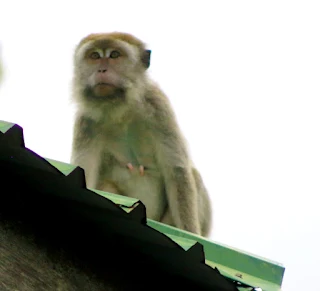Introduction
The encroachment of stray monkeys into human domains has become a concerning issue that highlights the consequences of human carelessness in development projects. As urban areas expand and forests are cleared for development, wildlife displacement and the disruption of natural habitats have led to the rise of stray monkeys seeking refuge in human settlements.
This article examines the problem, delving into the underlying causes and emphasizing the accountability of relevant authorities in executing development projects.
The Impact of Development on Wildlife
Development projects, aimed at enhancing infrastructure and meeting the needs of growing populations, often come at the expense of natural habitats. Forested areas are cleared without adequate consideration for the wildlife species that call them home. As their habitats diminish, animals, including monkeys, are forced to seek alternative sources of food, shelter, and territory, often leading them into human communities.
The Struggle for Survival: Monkeys and Human Encounters
Stray monkeys, displaced from their natural habitats, face numerous challenges as they venture into human domains. They struggle to find suitable food sources and suitable spaces to establish their territories. In search of sustenance, they often raid crops, garbage bins, and even homes, causing damage and posing potential risks to human safety. This conflict between humans and monkeys not only impacts the well-being of both parties but also exacerbates the strain on wildlife populations already struggling to adapt.
Negligence in Development Projects
The responsibility for addressing the issue of stray monkeys ultimately lies with the authorities responsible for planning and executing development projects. While development is necessary for societal progress, it is crucial that the impact on wildlife and the environment is given due consideration. Unfortunately, the failure to account for wildlife issues during the clearance of forested areas is a glaring example of negligence.
Mitigating the Stray Monkey Menace
To mitigate the problem of stray monkeys trespassing into human domains, it is imperative for relevant authorities to adopt a multi-faceted approach:
1. Wildlife Impact Assessments: Prior to commencing development projects, conducting comprehensive assessments of the potential impact on wildlife populations is vital. This includes assessing the migration patterns, habitat requirements, and ecological needs of the affected species.
2. Habitat Conservation: Incorporating measures to conserve and protect natural habitats within the development plan is essential. Designing green spaces, preserving wildlife corridors, and implementing reforestation efforts can provide alternative habitats for displaced animals.
3. Education and Awareness: Raising public awareness about the importance of wildlife conservation and responsible coexistence with animals is crucial. Educating communities about non-lethal deterrents, proper waste management, and the consequences of feeding monkeys can help reduce conflict.
4. Collaborative Efforts: Building partnerships between relevant authorities, environmental organizations, and community groups can facilitate effective management strategies. Implementing sterilization programs, establishing wildlife rehabilitation centers, and promoting sustainable development practices can yield positive outcomes.
Conclusion
The issue of stray monkeys trespassing into human domains in Brunei highlights the negative consequences of neglecting wildlife considerations in development projects.
It is the responsibility of the relevant authorities to prioritize the preservation of natural habitats and implement effective measures to address this problem.
In Brunei, there are laws in place to protect wildlife and regulate land use. The Wildlife Protection Act [1978] establishes the Department of Museums as the authority responsible for wildlife-related matters, including the creation of wildlife sanctuaries. The Land Code [1909] and the Land Acquisition Act [1949] govern land allocation, management, and tenure, covering both private and state lands.
However, there have been instances where the enforcement and execution of these laws have been lacking, often due to authorities overseeing development projects disregarding the provisions. This situation calls for better coordination between the various actors involved in wildlife preservation and land management.
When development projects disregard wildlife conservation, animals like monkeys are displaced from their natural habitats and end up seeking refuge in human settlements. This can lead to conflicts and risks for both humans and animals.
To address this issue effectively, it is essential for authorities to enforce the Wildlife Protection Act and related legislation. This includes conducting wildlife impact assessments before starting development projects, preserving natural habitats within those projects, and raising public awareness about the importance of wildlife conservation.
By addressing these shortcomings and ensuring the proper implementation of laws, Brunei can work towards a future where humans and wildlife coexist harmoniously. This will help protect the country's natural heritage for generations to come. (MHO0523)




.jpeg)
No comments:
Post a Comment